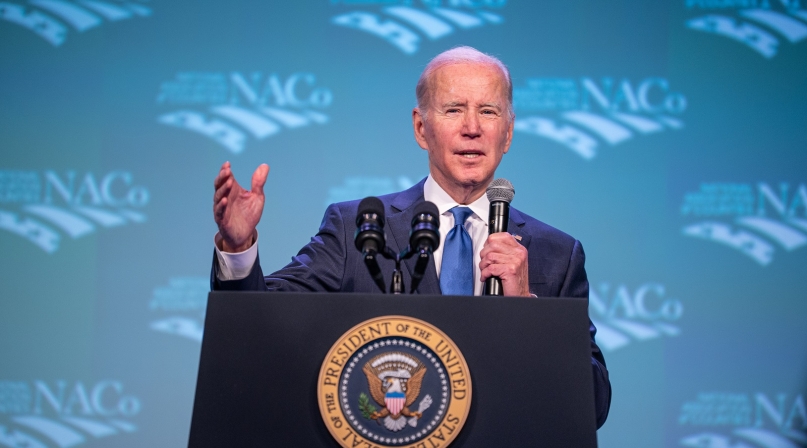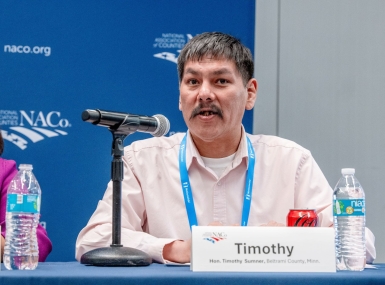Economic momentum, bipartisan hope mark Biden’s return to Legislative Conference

Key Takeaways
Not satisfied to coast on two years of legislative wins, President Joe Biden charted the path forward for what he called a blue-collar blueprint to rebuild America during consecutive addresses to NACo’s Legislative Conference.
First, he pledged to avoid defaulting on the nation’s debt, noting that even the likelihood of that outcome would wreak havoc on counties’ borrowing costs.
“I’m simply not going to let the nation default on its debt for the first time in history,” he told the Special General Session audience Tuesday, encouraging bipartisanism and stressing public service throughout but standing his ground on his legislative achievements (and his county experience, with two years on the New Castle County Council in Delaware).
Learn more
“I believe we could be fiscally responsible without threatening to send our country into chaos.”
A start, he suggested, would involve comparing his budget proposal alongside House Speaker Kevin McCarthy’s (R-Calif.) to find common ground.
“He’s a decent guy, he’s got a tough job,” Biden said. “He made it real clear to me what he wants to do. He says he’s not going to raise taxes at all, he just wants to cut programs.”
Biden rebutted potential cuts to programs, illustrating their projected effects on the deficit, which Biden took pride in reducing over his first two years in office.
Facing a divided government following the Republican takeover of the House, any legislation will need strong bipartisan appeal. Biden is hoping the Republicans interpret the 2022 midterm elections the same way.
“I believe people sent us a clear message in this off-year election: Fighting for the sake of fighting gets us nowhere,” he said. “We’re here to get things done.”
Even if the new Congress doesn’t pass any major legislation, he sees an opening for his economic plan, made possible by the passage of the American Rescue Plan Act, Bipartisan Infrastructure Law, CHIPS and Science Act and the Inflation Reduction Act.
“I’m really optimistic for the year ahead as implement the laws we’ve already passed,” he said “If we didn’t pass another single thing, the things that are going to take place by implementing just the laws we passed last year will deliver real benefits to people that they’re going to feel in their everyday lives.”
Those investments would serve to stabilize the economy following the height of the COVID-19 pandemic, fortify and grow the country’s infrastructure, boost manufacturing, encourage investments in renewable energy sectors and attack basic costs of living.
He emphasized the direct funding that the American Rescue Plan Act enabled with its $65.1 billion allocated to counties, which gave them the opportunity to spend where they see fit. Wishing he had the same kind of direct line to the federal government when he was in county government, Biden touted the stimulus’ fuel that kept counties from having to cut staff in response to lost revenue, while continuing to serve and even expand service to constituents in the wake of added demands from the COVID-19 pandemic.
“We urged you to use the rescue plan money to make your community safer, invest in affordable housing, get small businesses back on their feet, train your workforces, and you did,” he said.
He cited Ramsey County, Minn.’s program that trains nurses and licensed childcare professionals with addressing childcare needs that held back workers, Los Angeles County, Calif.’s job training for teenagers in vulnerable populations and Travis County, Texas’ and Pierce County, Wash.’s investment in housing to address homelessness.
It was the third straight appearance by a U.S president at an in-person NACo Legislative Conference after Donald Trump's 2020 speech ended a 24-year absence since Bill Clinton made consecutive addresses in 1995 and 1996. Biden had spoken at the 2015 Legislative Conference while serving as vice president. Gerald Ford spoke at the 1975 Legislative Conference, and Richard Nixon (1969), Jimmy Carter (1979) and Ronald Reagan (1982) spoke at Annual Conferences.
Biden credited the American Rescue Plan Act with making possible the addition of 12 million jobs over the past two years, and catalyzing 10.5 million applications for new small businesses in 2021 and 2022. But he was sore to point out where disinvestment in the United States’ core systems had shown up relative to other counties.
“If we’re going to have the strongest economy in the world, we have to have the strongest and best infrastructure in the world,” he said. “We’re also making the biggest investment ever in climate through the Inflation Reduction Act, creating millions of good paying jobs, investing in fenceline communities that have suffered the most as a consequence of being smothered by pollution.”
That was coupled with the CHIPS and Science Act, which Biden said would not only propel American manufacturing forward, but serve as the foundation for new hubs of innovation and economic growth in communities that have the tools and the talent but have lacked the confidence that comes from outside investment. He singled out an Intel semiconductor plant being built in Licking County, Ohio that was made possible by the act’s grants and incentives. That plant, Biden said, will offer thousands of good-paying jobs that won’t require a college degree.
“Where in the hell is it written to say we can’t lead the world of manufacturing,” he asked. “For decades, we imported products and exported jobs because of cheaper jobs overseas. Now America is exporting products and creating jobs at home.”
Biden stressed the everyday effects that the Inflation Reduction Act would have, particularly the price controls on prescription medicines and Medicare’s ability to negotiate on drug prices.
“My unwavering focus is on continuing to lower costs for families,” he said.
“As my Dad would say, ‘All I’m looking for, Joey, is just a little breathing room at the end of the month — just a little breathing room to have a little bit left over after I paid all my bills.’”
Biden was buoyed by the morning’s announcement that inflation hit 6.4 percent over the past 12 months, down from the 9.1 peak last summer.
“Today’s data reinforces that we’ve made historic progress and we’re on the right track,” he said. “Now we need to finish the job.”
Attachments
Related News

County Countdown – April 7, 2025
Every other week, NACo's County Countdown reviews top federal policy advocacy items with an eye towards counties and the intergovernmental partnership. This week features a budget reconciliation update, HHS restructuring and more.

NACo Legal Advocacy: Bondi v. VanDerStok
Garland v. VanDerStok has implications for the ability of county law enforcement to uphold public safety and investigate crimes involving ghost guns.

